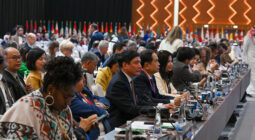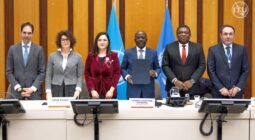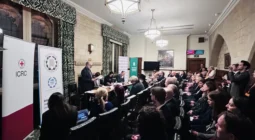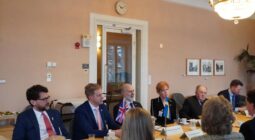

UK’s deep relations and history in the Gulf reflected in visit to UAE
The United Kingdom’s deep relationship and history with the Gulf formed the backdrop to our delegation to the UAE. The events of our past are now overlaid with many new ones which emphasise a more modern affinity, from commerce and trade, through our mutual interests in security and shared burdens such as Afghanistan, and not least to the some 120,000 UK nationals who live and work there. Our last outward visit had been 1996, so this one was well overdue.
I was accompanied by The Baroness Manzoor, CBE, (Lib Dem), Rt Hon the Lord Kilclooney (Ind), Lord Hylton (Ind) and Gabriella Liberotti-Harrison from the office. The visit took place on a re-arranged date during the Labour Party Conference which sadly left us without that representation.
Firm political ties were in evidence throughout. We were hosted by HE Mohammed Ahmed Al-Murr, the Speaker of the Federal National Council, which welcomed us with a round table discussion. There was a strong emphasis on the collective nature of their work, in that members represented the UAE in their deliberations, not their individual emirates. The UAE is a developing democracy, and the FNC demonstrated greater involvement for younger people compared with the elders of the past, and an expanded electorate moving from 7,000 hand-picked electors to over 100,000 in the future.
The Minister for International Cooperation and Development, HE Sheikha Lubna Al Qasami, with whom the UK has worked especially closely in recent years, gave a personal presentation of her departments work. She spoke of the ‘deep rooted and distinctive’ common search between us for humanitarian solutions, and agreed strongly with the continuing need for transparency and aid effectiveness. Her Excellency spoke with particular passion about the situation in Syria, saying it was ‘worse than anyone can believe’.
With all the Ministers in New York for the UN General Assembly I had feared that we would not be able to visit the Ministry of Foreign Affairs, but the newly appointed Perm Sec equivalent HE Mohammed Meer Abdullah Al Raeesi went out of his way to see us. A full discussion ensued on the threat from so-called ISIL in the region, and the UAE’s belief that only a comprehensive strategy, encompassing all the many elements of the extremist threat throughout the region, from Yemen to North Africa, would ultimately succeed. The openness of the conversation enabled alternative views to be put forward on how best to secure the safety of our peoples, but the urgency of the situation in Syria was common to us all.
With a visit to the Department of Health also, the delegation was given excellent access to Government and Parliamentary officials, which we much appreciated.
The UAE has a reputation for startling modernity. The development of Dubai is best observed, as we did, from the top of the world’s tallest building, the Burj Khalifa. But the extraordinary architecture and design on view is only part of the UAE’s modern story. Masdar is a planned city pioneering a solar and renewable energy base for living. Its innovative work is being watched world-wide. The UAE is conscious that fossil fuels will not last forever, and wants to be in the forefront of the future energy waves, and it is significant that it is the only OPEC country making such a heavy investment. We probed to what extent UK companies and higher education could make further contributions to the work.
UAE is also noticeable for the number of women in high profile positions, from Ministers to their UN Ambassador and the MD of Dubai 2020. In meeting HE Noura AlKaabi, CEO of the Media Zone Authority in Abu Dhabi, we were also meeting one of the Gulf’s highest rated IT and Media specialists. The Zone harnesses public and private innovation, and the CEO described a speed of technological change which encouraged local development whilst pulling in world-wide investment and companies. We discussed the public private split in such ventures and also raised the perceptions of the UAE’s willingness to allow freedom of expression, a difficult issue throughout the region.
Our time would not have been complete without meeting members of the UK business community with their Chairman Richard Oliver and the recently appointed UK Ambassador, Philip Parham. The group outlined both the challenges and opportunities of doing business in the UAE, emphasising that success took time, and that UK companies, including smaller ones, need to make the investment of time and effort, and not be afraid of taking the plunge. UKTI was there to assist. As we had explored with others, reputational issues of how overseas workers were treated, and legal differences could not be ignored, but Dubai 2020 offered a great opportunity. As the eye of the world would be upon the UAE, poor practices could be phased out so that the showcase event could similarly display values meeting the best of international standards.
At every turn our hosts made reference to the UAE’s journey. Juma Al-Majid, the chairman of the Dubai Economic Council, created a business in 1950 which is now global. But his philanthropic endeavours towards literary scholarship have created a research library which is now being digitised to allow international access. A visit to the National Archive reminded us of the depth of the historical tie between us, and to the Crossroads of Civilisation Museum, which emphasised the UAE’s recognition of how external forces had shaped them, and by analogy, all the rest of us.
A love of books, literature, maps and culture was on display, and we owe our biggest debt to the constant attention of HE Ahmed Obaid Al Mansoori, a member of the FNC, who accompanied us at all times throughout our stay, and was always available for the more challenging questions which often arise in the more casual moments of any IPU visit, as confidences are built up, and the conversation becomes free. It was a pleasure to meet him again as a member of the UAE delegation to the IPU Assembly in Geneva, where our conversations turned into practical co-operation on the Assembly’s agenda.
A short visit to the spectacularly beautiful Sheikh Zayed Grand Mosque, one the world’s largest mosques and an Islamic landmark, allowed us to appreciate what symbolises the country’s architectural achievements.
The delegation is highly appreciative of the efforts of Ms Liberotti-Harrison, to HE The Speaker of the Federal National Council and our hosts, and for forward planning to our Ambassador and to the UAE Ambassador to the UK, HE Abdulrahman Ghanem Almutaiwee, a great friend of the UK who will be much missed when his tour of duty ends shortly.













